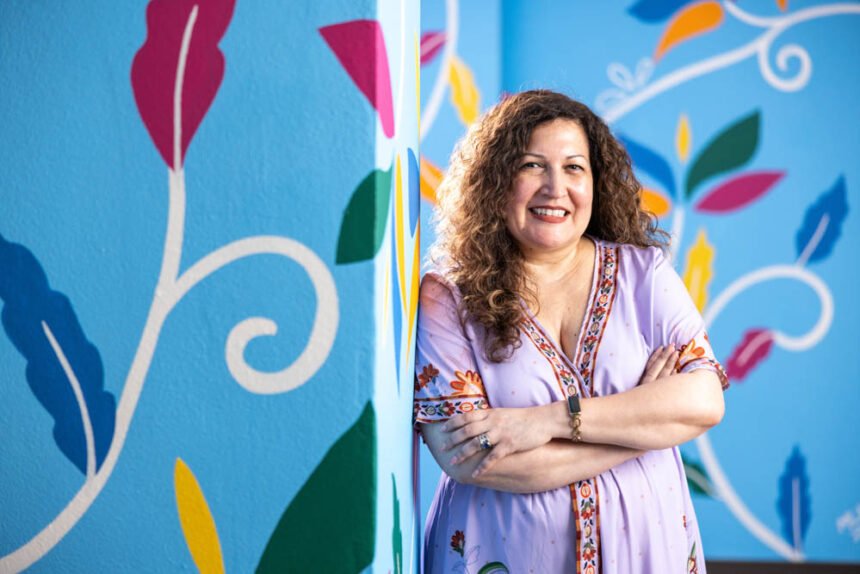When Leti Cavazos moved to Dallas from San Antonio, it was a culture shock.
Growing up in San Antonio, Cavazos always fit in. When she began to look into opening a business in DFW, she found that the area was very different.
“Being in San Antonio, which was predominantly Hispanic, and moving to Dallas, which is not, it was kind of a culture shock,” Cavazos says. “When I first got the job at the shelter, they were having a fundraiser, and the lady that was partnered with me … her daughter came over, and she introduced me and said, ‘This is Leti, she oversees the shelter.’ And her daughter looked at me and said, ‘Oh, are you over housekeeping?’”
“That was like, the reality of this is where I am. And I started looking around, and the only other Hispanics I could see were the people serving the food. And so I was like, ‘Oh, wow, this is different. This is not San Antonio anymore.”
But she never let this deter her.
Cavazos is the founder and CEO of the Cannenta Center for Healing and Empowerment. “Cannenta” has Latin origins and means “a woman possessing healing powers.”
Cavazos saw a need for more culturally sensitive services for diverse individuals and marginalized communities. It seemed they lacked a place that truly understood them and could help them with their healing journey while exploring their generational and cultural traumas.
In 2020, she started to visualize an idea to help fill this gap.
In 2021, Cavazos established the Cannenta Center, comprised of a diverse group of minority practitioners who can walk through the healing journey with clients.
“During COVID, everybody was kind of thinking about, what are we doing?” Cavazos says. “And I think it was that realization that I’ve been doing this for other organizations, other people, for so long, and I wanted to do something for me, something that that I believed in, something that I felt was going to impact the community, and something where I can help others.”
Cavazos holds a Doctorate of Social Work from the University of Tennessee, specializing in clinical practice and leadership. She has been recognized for her groundbreaking research on male victims of domestic violence experiencing homelessness and her subsequent contribution to the development of Texas’ first male domestic violence shelter.
She was recently honored as a recipient of the 2024 Leaders in Diversity Awards by the Dallas Business Journal for her contributions to diversity and inclusion in mental health services and the 2023 Quality and Excellence Emerging Business Award by the Greater Dallas Hispanic Chamber of Commerce for her innovation, community involvement and dedication to the Hispanic population.
At the Cannenta Center, Cavazos leads efforts to provide mental health services to diverse and marginalized groups, emphasizing affordable, accessible counseling.
The center offers services in English, Spanish and American Sign Language, using evidence-based techniques to empower clients on their healing journeys. Her counselors are trained to address topics such as depression, anger, anxiety, relationships and substance abuse.
Prior to opening the Cannenta Center, Cavazos worked with homeless individuals in San Antonio. This sparked her passion for helping others, specifically concerning mental health.
“There’s always that underlying trauma and mental health issues that goes with homelessness,” Cavazos says. “And so the last program I worked at in San Antonio, it was individuals who were not just chronically homeless, but had a severe mental illness like bipolar disorder, schizophrenia … and so mental health has just kind of been this underlying theme in the work I do.”
The first Cannenta Center location was in Addison, and the second in San Antonio. The Oak Cliff location opened in 2023.
“When we look at the data of where our clients are coming from, we’re serving people from all over Texas. The need is so great that we have clients from Houston, El Paso, The Valley. In Texas, there’s such a huge need for mental health services that are not just mental health services, but that’s culturally aware and speaks their language,” Cavazos says. “We were seeing a lot of people driving from Oak Cliff to Addison just to see us, and so we wanted to come to them so that removed that barrier.”
As far as expanding to more locations, Cavazos says they will take things slowly.
“I keep getting asked to expand to Fort Worth or other places and I think right now, our focus has to be on just building stability, because if we grow too fast, then the likelihood of us not being able to sustain it increases,” Cavazos says. “We have to be very intentional about our next steps.”
Cavazos says one of her favorite aspects of the foundation is not only being able to help clients, but helping each other as well.
“With the foundation, it helps people at different levels,” Cavazos says. “Yes, we’re helping the clients, but we’re also helping the therapists. And so when we elevate everybody, regardless of what position you’re in as a community, we’re all being elevated.”











